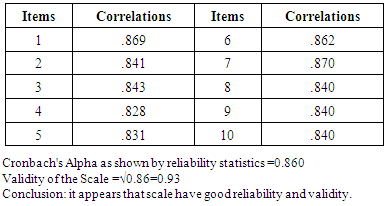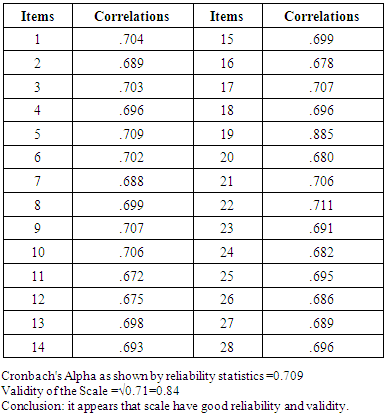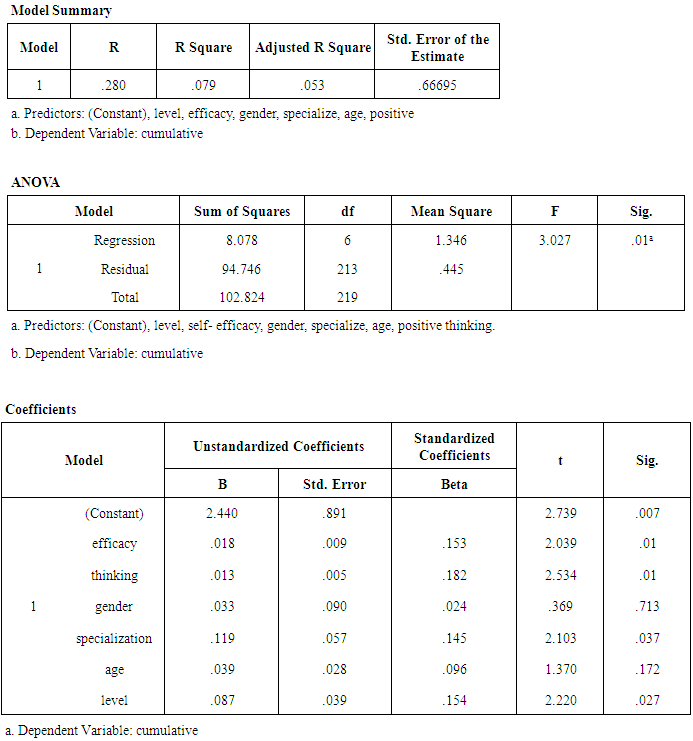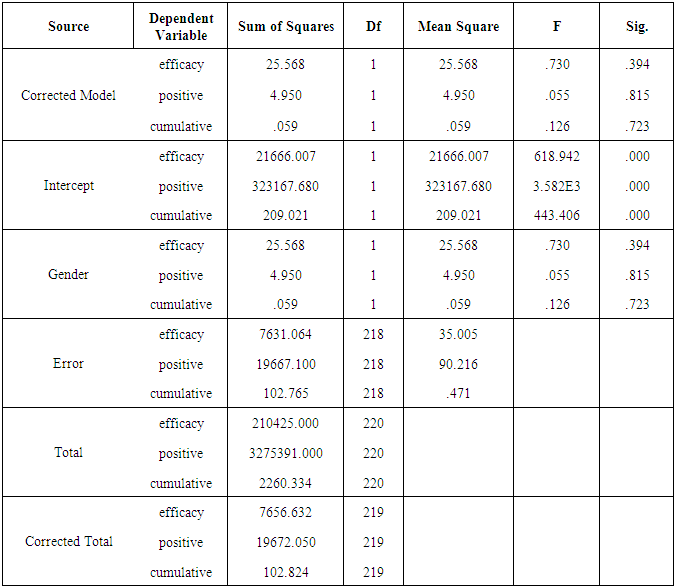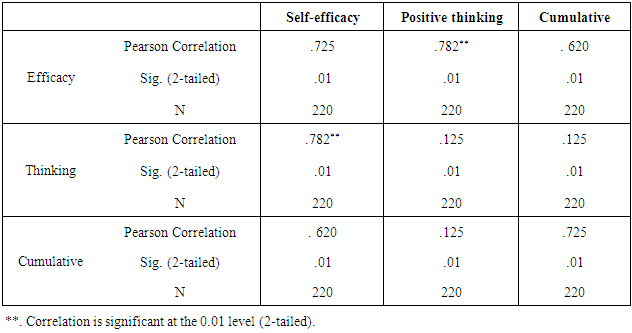-
Paper Information
- Next Paper
- Paper Submission
-
Journal Information
- About This Journal
- Editorial Board
- Current Issue
- Archive
- Author Guidelines
- Contact Us
International Journal of Psychology and Behavioral Sciences
p-ISSN: 2163-1948 e-ISSN: 2163-1956
2017; 7(6): 143-151
doi:10.5923/j.ijpbs.20170706.01

Self-efficacy, Positive Thinking, Gender Difference as Predictors of Academic Achievement in Al Jouf University Students-Saudi Arabia
Ibrahim Abdelrahim Ibrahim Humaida
Associate Professor of Psychology, Omdurman Islamic University-Sudan/Aljouf Universty, Saudi Arabia
Correspondence to: Ibrahim Abdelrahim Ibrahim Humaida, Associate Professor of Psychology, Omdurman Islamic University-Sudan/Aljouf Universty, Saudi Arabia.
| Email: |  |
Copyright © 2017 Scientific & Academic Publishing. All Rights Reserved.
This work is licensed under the Creative Commons Attribution International License (CC BY).
http://creativecommons.org/licenses/by/4.0/

This study examined the effect of self-efficacy, positive thinking and gender difference on academic achievement. To achieve this aim, the researcher used the descriptive causal methodology of research, and the selected sample size was (110) males and (110) females from different specializations by using equal stratified random sampling technique. The researcher used (SPSS) to analyze the collected data, statistical tests such as: multiple regression, analysis of variance, Pearson's correlation and T-test. Study findings indicated that both self-efficacy and positive thinking were significant predictors for academic achievement in students, also no significant statistical gender difference was found among the study participants. Findings also confirmed the hypothesis that there was significant correlation between self-efficacy, positive thinking, and academic achievement. Furthermore, findings pointed out statistically significant higher scores in the respondents. These results were discussed in the light of the previous studies, and the study was concluded by some practicable recommendations and suggestions as well.
Keywords: Self-efficacy, Positive thinking, Academic achievement, Gender difference
Cite this paper: Ibrahim Abdelrahim Ibrahim Humaida, Self-efficacy, Positive Thinking, Gender Difference as Predictors of Academic Achievement in Al Jouf University Students-Saudi Arabia, International Journal of Psychology and Behavioral Sciences, Vol. 7 No. 6, 2017, pp. 143-151. doi: 10.5923/j.ijpbs.20170706.01.
Article Outline
1. Introduction
- The students’ performance (academic achievement) plays an important role in producing the best quality graduates who will become great leader and manpower for the country as well as for the country’s economic and social development. Student's academic performance measurement and academic self-efficacy as well have received considerable attention in previous research, it is challenging aspects of academic literature, and science student performance are affected due to social, psychological, economic, environmental and personal factors. Some psychological factors play an important and significant role in enhancing or declining academic attainment such as academic self-efficacy which is worth investigating and use it to improve the academic performance of students in the different areas of education. Self-efficacy has been an essential element in theories of learning and motivation in different contexts. Furthermore, over the last three decades, psychological researches have used the idea of self-efficacy to predict and explain a wide range of human activities including academic achievement.Gender difference with regard to self-efficacy and positive thinking is also considered an enquiry that deserves an intensive research in the field of educational psychology. Therefore, educational psychologists all over the globe, attempt to carry out studies through sustained efforts in order to achieve certain educational goals, theories, and realistic results.Regarding positive thinking and its effect specifically on academic attainment, current literature reveals that positive thinking is considered a key element leading students towards success and achieving desirable learning outcome. Much research, on the other hand, has clarified the role of positive attitude of thinking as a mechanism underlying behavioral change in students. For example, there is evidence that positive thinking predicts such diverse outcomes as academic achievements, social skills and career choices.
1.1. Significance of the Study
- This research is of prime importance due to the fact that academic self-efficacy is a matter of concern for educators in modern educational researches all over the world.
1.2. Statement of the Research Problem
- This research seeks to find an answer to the following questions:1- Was there any gender difference in students' scores on both self-efficacy and positive thinking?2- What was the significance of predicting the academic performance due to some psychological variables? 3- Was there any significant correlation between self-efficacy, positive thinking, and academic achievement? 4- Was there any significant interaction as tested by ANOVA?
1.3. Objectives
- 1- To examine the effect of self-efficacy and positive thinking as predictors for students' academic achievement.2- To measure self-efficacy and positive thinking in students.3- To investigate gender difference in self-efficacy and positive thinking due to academic achievement.4- To test the significance of interaction between variables.
1.4. Hypotheses
- 1- Both self-efficacy and positive thinking are significant predictors for academic achievement in students.2- No Significant gender difference were found on self-efficacy and positive thinking related to academic achievement.3- Students’ scores on the psychometric scales were significantly higher.4- There was significant correlation found between scores on both scales and academic achievement.
2. Literature Review
2.1. Self-efficacy
- Self-efficacy is a key component of social cognitive theory and it is believed by many researchers to be an important contribution to the study of academic achievement. Efficacy, therefore, is a major source of action as people control their lives by their beliefs of personal efficacy.Bandura (1997) defined self-efficacy as: People's judgments of their abilities to organize and execute courses of action required to attain designated types of performances. Efficacious individuals expand more effort and persist longer compared to those who have low self-efficacy for achieving a specific task.According to Schunk (1991), as far as measuring self-efficacy is concerned, stated that individuals can judge their abilities depending on the particular domain of functioning.In educational research, as Pajares (1996) indicated, self-efficacy is an attempt to predict or explain academic outcome, and more likely there is a strong relationship between self-efficacy and academic interest.In fact, many researchers suggested that students’ self-efficacy may more accurately predict their motivation and future academic attainment as well, therefore, educators should focus their efforts primarily on providing students with mastery learning and opportunities for achieving better academic attainment.In focusing on the relationship between self-efficacy and academic achievement, the researchers in this current research attempt to review some related previous studies that highlighted also self-efficacy as predictor of academic attainment in students: Motlagh, Yazdani and Souri (2011) conducted a research, the result showed that self-efficacy was a considerable factor in academic achievement.Jahanian and Mahjoubi (2013) carried out a study that aimed at identifying the effect of self-efficacy on academic achievement among college students. The researcher found a significant relationship between self-efficacy and academic achievement.In this respect, there was a study carried out by Loo and Choy (2013) about the effect of self-efficacy sources (mastery experience, vicarious experience, social persuasion and emotional arousal) on academic achievement. The researcher found that all four self-efficacy sources were related to academic achievement.Azar (2013) conducted a research on self-efficacy, achievement motivation and academic procrastination as predictors of academic performance. The finding indicated that academic self-efficacy was the best predictor of academic performance among students.Further, the effect of self-efficacy as predictor of academic achievement was investigated by Hassan and Alasmari (2015), the finding pointed out those students with higher levels of self-efficacy showed higher academic performance. A growing body of literature supported the relationship between students, self-efficacy beliefs for academic tasks and their overall academic performance. Some researchers (Paul and Gore, 2006, Lilian, 2012) investigated the role that academic self-efficacy can play in predicting college success. They found a positive significant correlation between the variables.In a study conducted in Spain (Valle, 2009), in which the researcher studied the relationship between university students, self-efficacy and learning. It revealed out that higher self-efficacy put more efforts into students, academic achievement.Sources of self-efficacy indicate that individuals can perform well in learning situations owing to the following four sources: mastery learning, vicarious experience, social persuasion, and physiological reactions. (Strauser, 1995).Concerning motivational consequences of self-efficacy, Pajares (1996) and Artino (2006), noted that self-efficacy can enhance human achievement, and individuals, therefore, tend to select activities and tasks in which they feel competent and confident.
2.2. Positive Thinking
- Despite the fact that there might be a large body of literature regarding the nature of relationship between thinking styles and academic achievement, the researcher in this current study attempts to elaborate just in brief the effect of positive thinking on academic attainment.Starting with some definitions given by some researchers: Positive thinking is a manner of thinking that puts emphasis on processing thoughts in a more desirable way. According to Seligman, M. (2006), positive thinking is a mental attitude that admits into the mind thoughts, words, and images that are conducive to growth and success.According to Seligman, M. (2006) and Carroll J. B. (1993), positive thinking is linked to a wide range of health benefits including: longer life span, less stress, low rate of depression, increased physical well‐being, and better mental health.And also, Zang et al (2013), stated that people who maintain a positive approach in thinking about life situations and challenges will be able to move forward more constructively than those who remain in a negative attitude. Mental and physical health can be improved by learning how to hold a positive state of mind.However, some studies have shown that positive thinking is linked to creativity and thus academic achievement in Hong Kong university students (eg. Zhang & Zhua, 2011), in which students with higher thinking levels had higher academic performance as noted by their GPAs.Academic achievement in this context means the ability of students for passing successfully final tests of pre-determined syllabuses. Moreover, academic achievement includes all thinking styles used by students or learners and which are considered as corner stone for achieving desirable learning outcome.In this juncture, Caisday (2013), investigated the relationship between thinking styles and academic achievement. The result indicated that thinking positively had predicted the academic achievement of students.Sternberg was the first to who introduced the concept of thinking styles; he defined thinking styles as different techniques that people use in data processing and how they use their abilities (Sternberg, 1997).Fan & Zhang (2009) carried out a research studying the effect of thinking on achievement motivation among students in higher educational institution. They found that thinking was positively correlated with academic achievement.In a study conducted by Grigorenko & Sternberg (1997), which was designed to examine the role of thinking style in academic performance. The result showed that styles of thinking significantly contributed to prediction of academic performance. Moreover, equally able thinkers of different styles tend to do better in different assessment situations.The way the students think affects all aspects of life, however, recently proper attention has been given to students thinking and its impact on learning (Riding & Cheema, 1991).Positive thinking is an important concept in educational psychology; it includes special skills to identify and analyze any academic problem (Vermunt, 1992).Other researchers maintained that positive thinking has significant role in higher education and is considered one of the main concerns in mainstream education(Grigorenko and Sternberg, 1995), while some scholars believe that positive thinking is a part of individual's genetic makeup, however, modern research shows that thinking skills are both inborn and acquired through learning (Mayer, 1983).
3. Methodology
- The researcher employed the descriptive research methodology (causal & correlation).
3.1. Participants
- The population, from which the sample of the current research was drawn, represents students of Aljouf University –Saudi Arabia.The sample size consisted of (220): (110 males and 110 females) based on equal stratified random sampling technique. Respondents, age mean was (22.39) with standard deviation (1.688).The following figure 1 shows age frequencies of students:
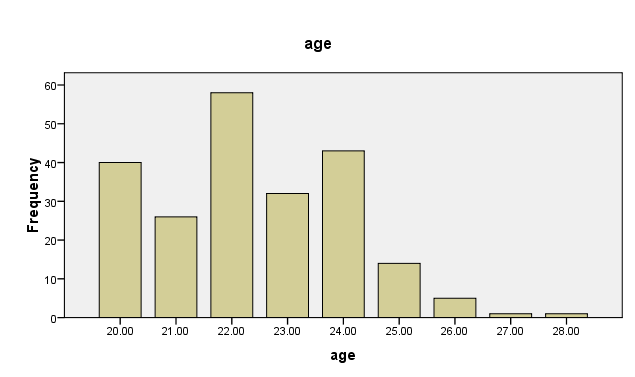 | Figure 1 |
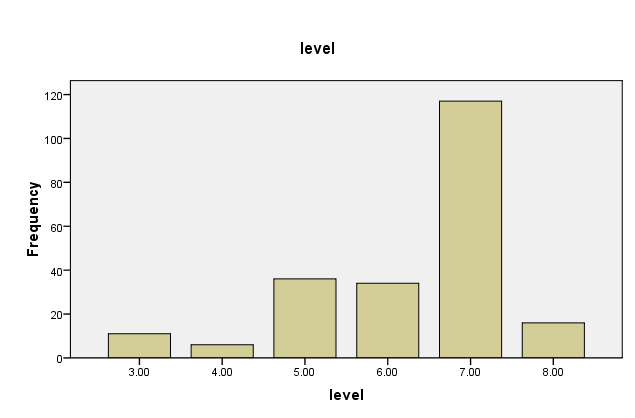 | Figure 2 |
3.2. Psychometric Tools
- The researcher administered the following scales:
3.2.1. Self-efficacy Scale
- The General Self-Efficacy Scale (GSE), it was written by Ralf Schwarzer & Matthias Jerusalem German version developed in 1979 by Matthias Jerusalem and Ralf Schwarzer, and later revised and adapted to 26 other languages by various co-authors.The scale was created to assess a general sense of perceived self-efficacy with the aim in mind to predict coping with daily hassles as well as adaptation after experiencing all kinds of stressful life events. In addition to the fact that the scale is one-dimensional.To calculate the internal consistency of the scale, the researcher usesd Alpha Cronbach Formula as pointed out on the following table:
|
3.2.2. Positive Thinking Scale
- This scale was used in another previous research conducted by Humaida (2013). It was available online (https://www.northsidecounselling.com.au/).To obtain internal consistency of the scale, the researcher used Cronbach's Alpha as displayed on the following table:
|
3.2.3. Academic Achievement (AA)
- Students, academic achievement levels were obtained from their GPAs.
3.3. Procedure
- Prior to this study, both self-efficacy and positive thinking scales were translated into Arabic. They were back-translated and then checked by some experts to ensure the accuracy, clarity of wording, and suitability of items to the participants. The participants were asked to complete first the personal data (such as: gender, level, specialization, and cumulative), and then also to complete accurately the data available on both self-efficacy and positive thinking scales.The respondents were also assured that their participation in the research was voluntary and their responses would remain confidential and be used for research purpose only.
3.4. Statistical Analysis
- Statistical analyses were conducted using (SPSS) version-16 as follows:For internal consistency of the psychometric tools, the researcher used Alpha Cronbach Formula.To analyze the research the collected data and hypotheses, the following statistical tests were used:1- Multiple Regression (Path Analysis).2- Analysis of Variance (ANOVA).3- Pearson Correlation Coefficient.4- T-test for one sample.
4. Results
- In order to analyze the hypotheses of the research, some statistical tests were used as shown in the following tables:
|
|
|
|
5. Discussion
- As it was indicated previously, the aim of this research was to examine the effect of both self-efficacy and positive thinking on academic achievement in students.Regarding the result of the first hypothesis, as shown from the result of multi-variable regression. That both self-efficacy and positive thinking had a significant direct effect on academic performance of students. This finding is similar with the findings of many previous researches (Paul & Gore, 2012), and also consistent with the studies conducted by Vuong et al., (2010); Valle (2009). Positive thinking, on the other hand, can also affect directly on students, cognitive processes and academic performance. This finding was also supported by a study conducted by Grigorenko & Sternberg (1997). Furthermore, Azar (2013), revealed that academic self-efficacy was a significant predictor of academic performance.The result of ANOVA related to the second hypothesis of this research, showed that no significant gender difference was found on self-efficacy and positive thinking due to academic achievement. This finding did not agree with the results of Busch's (1995), in which females had significantly lower self-efficacy than males. Also, the present finding was inconsistent with Al-Attiyah's (2010), who reported that males had significantly lower self-efficacy than females. These fluctuating results may be due to cultural differences. Regarding the result of the third hypothesis, there was a significant correlation between self-efficacy, positive thinking, and academic achievement of students. This result was consistent with findings from other previous studies such as: Ahmed & Rana (2012), Pintrich & Schunk (2002), found that learners with high self-efficacy were much more likely to be motivated in terms of effort exerted and persistence than those with lower self-efficacy who were incapable and had no tendency to participate. Moreover, learners with high self-efficacy were also more cognitively engaged in learning and thinking than those who had reservations about their abilities to succeed (Pintrich, 1999). In the same vein, Greene et al. (2004) found that self-efficacy was positively correlated with thinking style.Related to the result of One-sample T-test as far as the fourth hypothesis is concerned, the respondents’ scores were significantly higher on both scales. This result agreed with Azar’ s (2013), And also, (Tucker, Zayco, and Herman, 2002), who suggested that only higher achievers were also highly motivated.
6. Conclusions
- Despite the specific findings of this present research, it is worth noting to emphasize those findings should be interpreted by taking into account the limitation that is the limited context of this study. And also this study was conducted and centered only on a particular group of learners and specializations; it may not be generalized to other population.Nevertheless, the present study can be considered as step toward understanding and predicting the students’ actual performance according to some other psychological variables. Moreover, further and intensive research is needed to investigate a larger context where generalization can be applied to other population.
7. Recommendations
- 1- Educators should be encouraged to consider their students’ self-efficacy related to academic achievement.2- Higher institution specialists should explicitly address their students’ thinking styles to provide more effective instruction.3- Assessing students’ self-efficacy can provide educators with important insights about their students’ academic motivation.
Suggestions for Future Researches:
- 1- Academic self-efficacy: from theory to practice.2- Self-efficacy and thinking styles in learning situation-an empirical study. 3- Student’s perception of competence, its influence on achievement motivation.
Appendixes
- (1) The General Self-efficacy Scale (GSE)Below are ten statements about yourself which may or may not be true. Using the 1-4 scale below, please indicate your agreement with each item by placing the appropriate number on the line following that item.Please be open and honest in your responding.
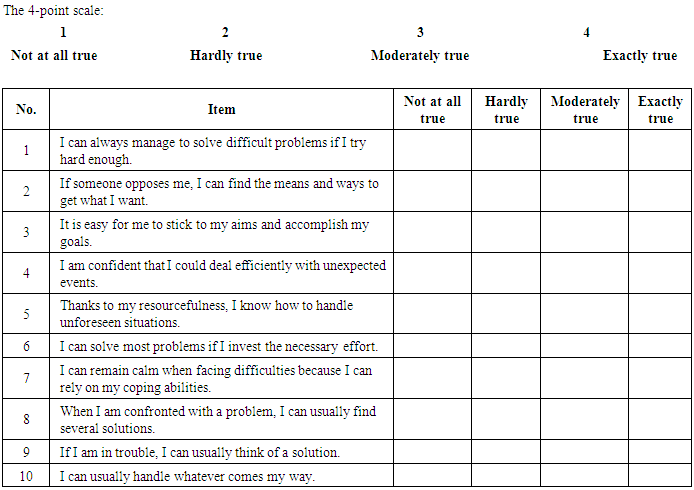 (2) Positive Thinking Scale:
(2) Positive Thinking Scale: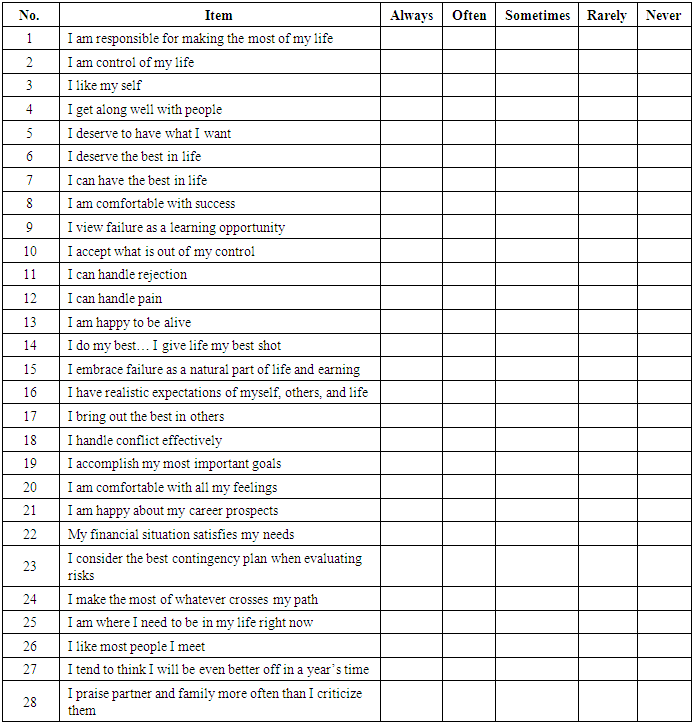
 Abstract
Abstract Reference
Reference Full-Text PDF
Full-Text PDF Full-text HTML
Full-text HTML